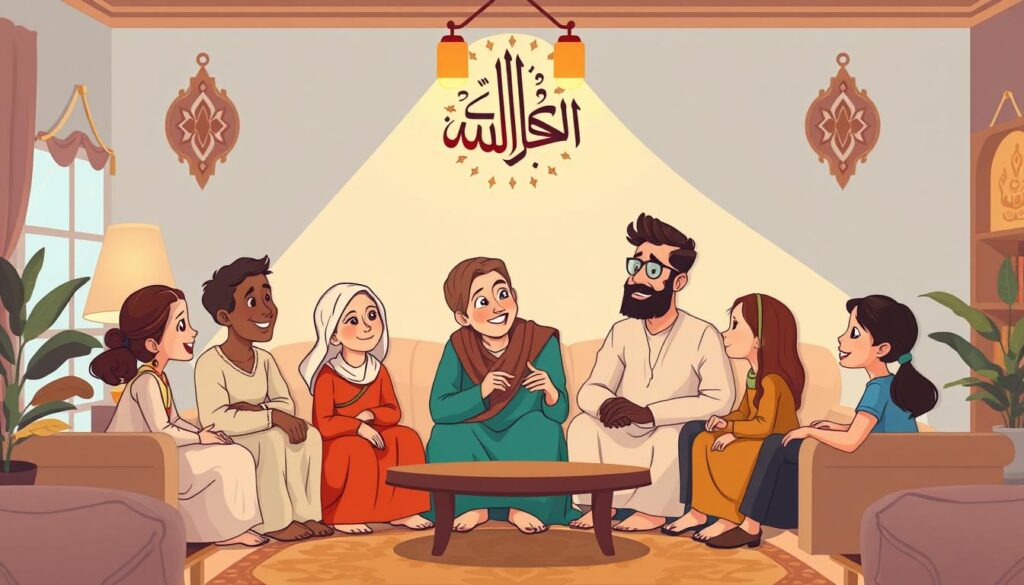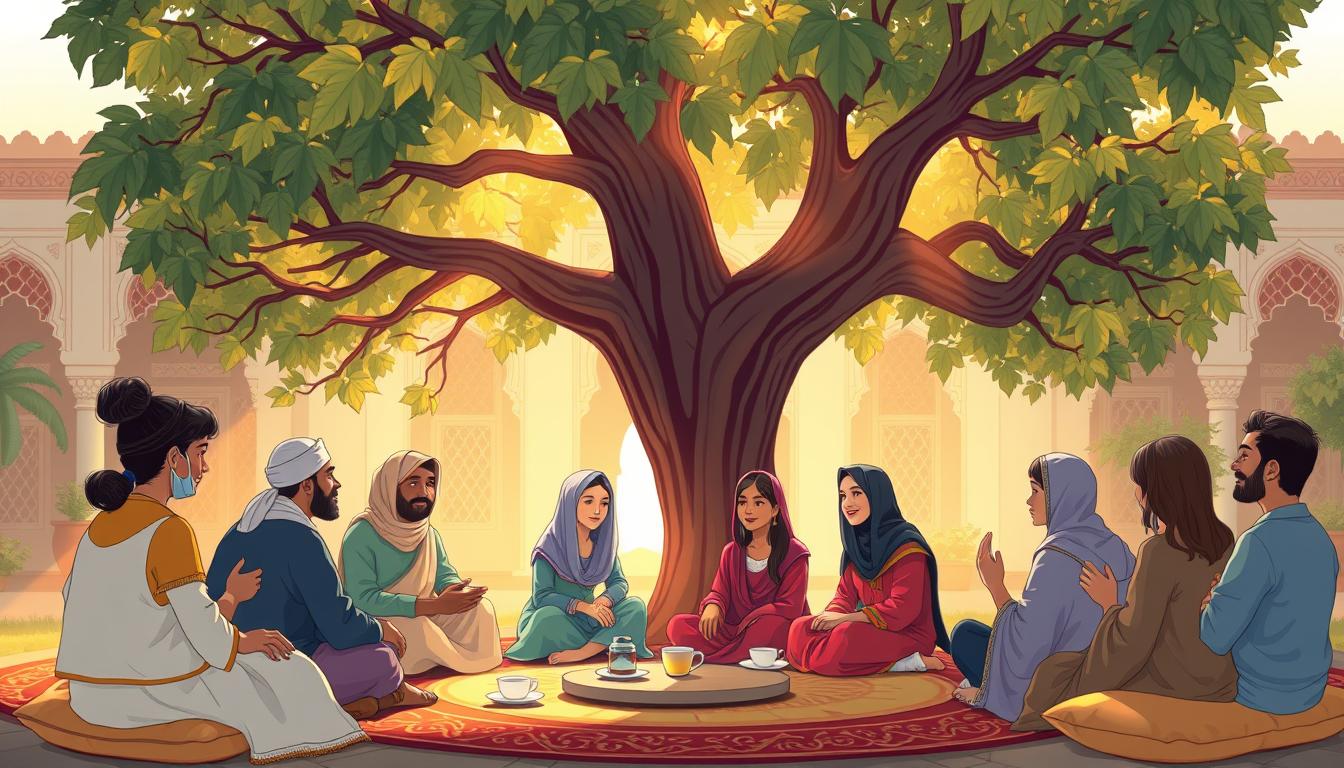In life, we all face challenges that can shake our emotional health. For Muslims, it’s vital to open up about these issues. Islamic emotional support networks are key. They focus on bringing us together and providing support rooted in our faith. Many of us deal with anxiety and depression because of pressures from work, society, and family.
More than 30% of Muslims feel stressed due to school and work. Nearly 20% suffer from anxiety and depression. Sadly, because of cultural stigma, 60% don’t seek the help they need. Yet, groups like the Umar Khan Charity Organization are stepping up. They offer access to Muslim mental health resources. This strengthens our emotional well-being through faith and community.
Here, we highlight how crucial Islamic emotional support networks are. And we’ll help you find ways to seek healing within our faith.
Key Takeaways
- Islamic emotional support networks are vital for addressing mental health issues.
- Community connection plays a key role in emotional healing and resilience.
- Over 30% of Muslims face stress from academic and work pressures.
- Cultural stigmas often prevent Muslims from seeking necessary mental health support.
- Faith-based organizations are essential in providing Muslim mental health resources.
- Engaging with these networks fosters a sense of belonging and emotional stability.
Understanding Islamic Emotional Support Networks
Our path to emotional well-being deeply values the power of community support. In Islam, this support is key to helping those with mental health struggles. It links us together, reducing loneliness and boosting our collective strength.
The Importance of Community in Islam
Within Islam, community forms the backbone of emotional support networks. It brings us friendship and advice when times are tough. Surveys indicate that nearly 90% of people find comfort in prayer and their faith to manage stress.
- Muslim communities gather for prayers and events that bring comfort.
- Family and friends play a crucial role in understanding mental health.
- Activities like collective Dhikr strengthen our emotional resilience.
Defining Emotional Support in an Islamic Context
Emotional support in Islam covers many areas. It includes spiritual advice, shared stories, and group activities aimed at mental health. Many people wish for more religious or spiritual care in their lives. Effective support networks help us tackle the stigma attached to mental health issues.
Islamic teachings highlight important values like patience and self-control. These virtues aid in managing our feelings. Reflecting on ourselves leads to growth and better emotional well-being.
The Role of Faith in Emotional Well-Being
Faith plays a big role in how Muslims feel emotionally. Becoming part of religious activities is key for their mental health. Doing these rituals regularly makes them more resilient and emotionally stable.
Spiritual Practices for Mental Health
Dhikr (remembering Allah) and dua (prayers) are not just spiritual acts. They help handle stress and worry too. About 60% of Muslims say these practices lower their stress levels. Reading the Quran brings them peace and helps them be more mindful. Around 70% feel that being involved in these spiritual acts makes their mental health better.
The Connection Between Prayer and Emotional Resilience
Prayer is a strong tool for coping with life’s tough times. Doing Salah or ritual prayers regularly brings calmness. Studies show people who pray a lot feel happier and less stressed. Coming together to worship helps everyone feel supported. Up to 80% of Muslims think getting emotional and practical help from others is key to dealing with mental health issues.

| Spiritual Practice | Benefits | Statistics |
|---|---|---|
| Prayer (Salah) | Reduces stress, enhances focus | 60% report reduced anxiety |
| Dhikr | Promotes mindfulness and calmness | 30-50% decrease in anxiety symptoms |
| Dua | Strengthens emotional support | 70% find improvement in mental well-being |
For those wanting to know more, many Islamic mental health resources can help. They offer guidance on improving well-being through faith and togetherness.
Finding Local Islamic Support Groups
Joining local Muslim support groups helps with emotional healing and finding friends. These groups offer various programs like grief help, parenting advice, and mental health sessions. They give a safe place to share stories and feel you belong to a community. By joining, we can face mental health issues together and strengthen our faith.
Types of Support Groups Available
There are different local Muslim support groups for different needs. Here are some:
- Grief Support: Helping people deal with losing someone close.
- Parenting Classes: Helping parents raise kids with Islamic values.
- Mental Health Workshops: Teaching about mental health and where to get help.
- Islamic Therapy Services: Giving counseling and support based on Islamic principles.
How to Locate Resources in Your Area
Finding local mental health resources begins with local mosques and Islamic centers. They often know about or offer support groups. Online guides can also help find Muslim therapists. The Muslim Association for Psychological Services (MAPS) provides a big list of therapists and telehealth if you can’t find local help.
| Organization | Services Offered | Contact Method |
|---|---|---|
| MAPS | Marriage counseling, individual therapy, group therapy | Local chapter, telehealth |
| Khalil Center | Culturally-sensitive therapy | In-person and online |
| Muslim Community Helpline | Phone, email, chat support | Available 24/7 |
| Naseeha Muslim Youth Helpline | Support for Muslim youth | Phone, text, chat |
Online Platforms for Emotional Support
Nowadays, finding emotional support online has changed how we look for guidance in Islam. We live in a time where online Islamic counseling is more accessible than ever. Many websites and apps are designed for Muslims, offering personalized help. This makes getting support more effective and easy to get.
Websites and Apps Tailored for Muslims
There are many Muslim support apps and sites that meet different needs. They provide everything from one-on-one counseling to learning resources. For example, Ruh Care connects people with Muslim therapists for chat, phone, or video sessions. This makes it simple to get help from home. They address various mental health issues like anxiety, trauma, and problems in marriages.
The Benefits of Virtual Support Networks
Using virtual mental health resources has several benefits:
- Accessibility: Users can find therapists from around the world, making support available no matter where you are.
- Convenience: You can have sessions by phone or video, so you can stay at home for therapy.
- Anonymous Participation: Being private in sessions might make people more comfortable seeking help.
- Diverse Support: There’s help for all kinds of people, including singles, couples, families, and kids, with therapists who speak multiple languages to aid in talking.
- Alignment with Faith: The therapy respects cultural beliefs and Islam, building a respectful and understanding environment.

We should welcome these digital tools and use them for our emotional well-being. By adding these modern options into our faith, we can get stronger together and create a supportive community.
| Feature | Ruh Care |
|---|---|
| Therapist Credentials | At least three years of experience, licensed |
| Session Types | For individuals, couples, children, and families |
| Languages Offered | English, Arabic, Hindi, and more |
| Introductory Session | Free 15-minute call |
| Insurance Compatibility | May be covered by extended health plans |
Cultural Sensitivity in Emotional Support
Cultural sensitivity is key in mental health care for Muslim communities. People worry if their beliefs are respected by professionals. This shows the need for care that respects their values. Creating supportive networks helps everyone understand and care, making people feel seen in their struggles.
Navigating Stigma Around Mental Health
Stigma often stops people from getting help. In Muslim communities, fear of judgment can keep people silent about mental health. Research shows about 60% of Muslims hide substance use due to social rejection fears. To change this, we must teach the value of talking about mental health. This can reduce stigma in Muslim communities.
Emphasizing Inclusivity in Support Networks
Support networks must honor Islam’s cultural diversity. People’s backgrounds affect their therapy experiences, highlighting the need for specialized approaches. Mosques can serve as key support spaces, with over 80% of Muslims turning to their community for help. Creating safe spaces for sharing and getting appropriate support is crucial. For more on improving mental health access, visit this page.
The Impact of Counseling in Islam
Counseling helps many Muslims deal with mental health issues. It’s especially key in cultures with heavy pressures. Faith-based counseling in Islam combines religious teachings with mental health therapy. This blend, supported by Muslim counselors, creates a space where individuals feel respected and understood.
Faith-Based Counseling vs. Traditional Counseling
Differences between faith-based and traditional counseling include:
- Spiritual Integration: In faith-based counseling, there’s a big focus on mixing spiritual practices with Islamic truths. This often means a lot to clients.
- Cultural Sensitivity: Muslim counselors understand the cultural factors that affect mental health. This helps clients relate more.
- Confidentiality: Keeping things private is key in Muslim counseling. It builds trust in communities where closeness is valued.
How to Find an Islamic Counselor
There are easy ways to find Islamic therapy services:
- Local Mosques: Mosques often have contacts for Muslim counselors who know the community’s needs well.
- Community Directories: Local listings can show you certified Muslim therapists and what they specialize in.
- Online Platforms: There are websites just for the Muslim community to find good counselors.

Community Involvement as a Healing Tool
Being active in your community boosts mental health. Helping out in places like Muslim communities links us together, reducing loneliness. It gives us a feeling of being part of something bigger. This makes us happier and healthier. By volunteering, we support each other and make our community stronger.
Volunteering Opportunities within Your Community
There are many ways to volunteer and make a difference. These activities help those in need and enrich our own lives. Some common ways to volunteer include:
- Tutoring and mentoring youth in academic subjects
- Organizing food drives to assist families in need
- Providing healthcare services in local clinics
- Participating in community clean-up projects
- Helping with fundraising events for charitable projects
The Psychological Benefits of Helping Others
Helping out in the community has many mental benefits. Studies link volunteering to better emotional health. Some key benefits are:
| Benefit | Description |
|---|---|
| Enhanced Purpose | Finding meaning in helping others strengthens personal identity and values. |
| Reduced Anxiety | Engaging with others can alleviate feelings of loneliness and anxiety during challenging times. |
| Improved Mood | Acts of kindness boost happiness and satisfaction levels through positive interactions and impacts. |
| Greater Community Connection | Building relationships within the community expands social support networks and enhances belonging. |
Helping our community links directly to better mental health. Volunteering lifts up others and deepens our spiritual values. It teaches us the joy of serving beyond our needs, boosting our community’s spirit.
The Role of Family in Support Networks
Family ties are vital for emotional support in Islam. They help create a world where everyone feels stable and can talk openly. Families face challenges, but understanding these can make them stronger against mental health issues.
Strengthening Family Bonds for Emotional Stability
In Islam, family is the foundation of a strong society. The Quran talks about how family members should support each other. Verse 2:187 describes spouses as garments for each other, showing the deep bond they share.
Strong family bonds come from doing things together and valuing each other’s company. Parents should be kind and teach their children good morals. This way, children learn to be honest and kind.
Talking openly in the family helps solve problems. Getting ready for life’s hurdles with emotional support is key. Family therapy, in line with Islamic values, can guide families through tough times.
Communicating Needs Within Family Structures
Good communication in the family addresses everyone’s emotional needs. It builds a safe and understanding home. The Prophet Muhammad taught us the value of empathy and kindness in families.
Talking about feelings and mental health is important. It makes everyone feel important and cared for. Including extended family adds more support, helping cover more emotional needs.
| Family Roles | Characteristics |
|---|---|
| Husband | Provider, ensures family well-being |
| Wife | Nurturer, reflects compassion |
| Parents | Instill values, balance discipline with kindness |
| Children | Learn moral values, practice communication |

Steps to Create Your Own Support Network
To start building a support network, we first need to understand our community’s unique needs. It’s also key to know what mental health support is available. At community gatherings, mosques, or even online, talking openly can spark interest. It also builds a sense of unity. Working together like this sets the foundation for a supportive space. This space will focus on mental health and well-being.
Identifying Needs and Resources
Identifying mental health resources is easier with tools like the Mental Health Toolkit by ISPU. This toolkit helps address challenges American Muslim children face. With it, we get insights into bullying, Islamophobia, and more. As a community, we can learn and create solutions for these challenges.
Building a Supportive Group in Your Community
Forming support groups in our community is key for healing and becoming resilient. Resources like the Domestic Violence Toolkit from the Peaceful Families Project help. So does the Healing Program from Malikah. These resources let us start groups focused on specific needs. By doing this, we not only connect but also show we’re dedicated to mental wellness. And we stand together against challenges.






